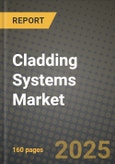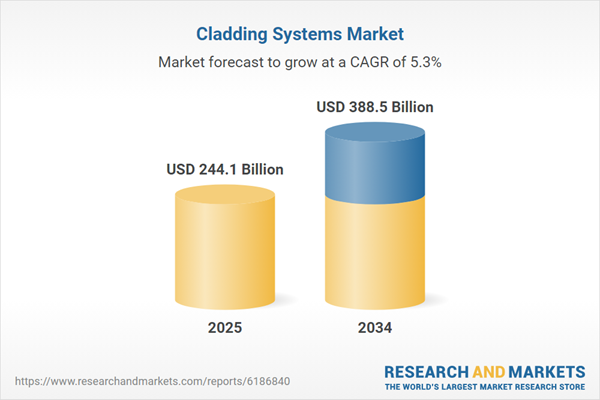The cladding systems market is experiencing significant growth, driven by rising construction activities, stringent building codes, and increased demand for energy-efficient and aesthetically pleasing building exteriors. Cladding systems are used to protect buildings from environmental elements while enhancing their thermal and acoustic performance. With urbanization and the expansion of commercial, residential, and industrial sectors, developers are turning to advanced cladding solutions to meet modern architectural and environmental standards. Additionally, the trend toward sustainable construction materials and practices has further fueled the adoption of innovative cladding systems that reduce energy consumption and carbon footprints.
Technological advancements in cladding materials, such as fiber cement, metal composites, and high-performance glass, have expanded the range of design options available to architects and contractors. These materials not only offer improved durability and weather resistance but also contribute to building certifications such as LEED and BREEAM. Furthermore, the growing popularity of ventilated façades, which enhance natural ventilation and thermal insulation, reflects the industry’s shift towards integrated, multifunctional cladding systems. This shift aligns with the broader trend of designing buildings that are both energy-efficient and visually striking, a priority in densely populated urban areas where space optimization and aesthetic appeal are crucial.
However, the market is not without challenges. High initial costs, limited awareness of long-term benefits among smaller contractors, and regulatory variations across regions can pose barriers to wider adoption. Nonetheless, as building performance requirements tighten and sustainability becomes a central focus in construction, the cladding systems market is poised to expand, driven by innovation and a growing preference for eco-friendly, high-performance solutions.
Key Insights: Cladding Systems Market
- Increasing use of sustainable and recyclable materials in cladding systems.
- Adoption of ventilated façades for improved thermal performance and natural ventilation.
- Rising demand for high-performance composite panels offering durability and design flexibility.
- Integration of cladding systems with energy-saving technologies such as solar panels.
- Expansion of lightweight cladding materials to reduce structural loads and installation times.
- Growing construction activities in urban areas and emerging economies.
- Stricter energy efficiency regulations and green building certifications pushing innovation.
- Rising demand for aesthetically appealing and architecturally versatile exteriors.
- Advancements in material technology enhancing durability and weather resistance.
- High upfront costs and maintenance requirements for certain advanced cladding solutions.
- Lack of awareness about long-term cost savings and benefits among smaller contractors.
- Regulatory differences across regions complicating compliance and standardization.
Cladding Systems Market Segmentation
By Material
- Steel
- Aluminum
- Zinc
- Copper
- Plastic Panels
By Application
- Walls
- Roofs
By End User
- Residential Buildings
- Non-Residential Buildings
Key Companies Analysed
- Mitsui & Co. Ltd.
- Itochu Corporation
- Marubeni Corporation
- Toyota Tsusho Corporation
- Compagnie de Saint-Gobain S.A.
- Sumitomo Corporation
- Nippon Steel & Sumitomo Metal Corporation
- JFE Steel Corporation
- Tata Steel Limited
- Hindalco Industries Limited
- Sojitz Corporation
- Kobe Steel Ltd.
- Westlake Chemical Corporation
- Cold Steel Corporation (Taiwan)
- DuPont de Nemours Inc.
- Alcoa Corporation
- Alubond USA Inc.
- Kingspan Group plc
- Etex Group
- James Hardie Industries plc
- Boral Limited
- Arconic Corporation
- CSR Limited
- Nichiha Corporation
- Kajaria Ceramics Limited
- Glen-Gery Corporation
- Greenlam Industries Limited
- Glittek Granites
- FunderMax GmbH
- Axiall Corporation
Cladding Systems Market Analytics
The report employs rigorous tools, including Porter’s Five Forces, value chain mapping, and scenario-based modeling, to assess supply-demand dynamics. Cross-sector influences from parent, derived, and substitute markets are evaluated to identify risks and opportunities. Trade and pricing analytics provide an up-to-date view of international flows, including leading exporters, importers, and regional price trends.Macroeconomic indicators, policy frameworks such as carbon pricing and energy security strategies, and evolving consumer behavior are considered in forecasting scenarios. Recent deal flows, partnerships, and technology innovations are incorporated to assess their impact on future market performance.
Cladding Systems Market Competitive Intelligence
The competitive landscape is mapped through proprietary frameworks, profiling leading companies with details on business models, product portfolios, financial performance, and strategic initiatives. Key developments such as mergers & acquisitions, technology collaborations, investment inflows, and regional expansions are analyzed for their competitive impact. The report also identifies emerging players and innovative startups contributing to market disruption.Regional insights highlight the most promising investment destinations, regulatory landscapes, and evolving partnerships across energy and industrial corridors.
Countries Covered
- North America - Cladding Systems market data and outlook to 2034
- United States
- Canada
- Mexico
- Europe - Cladding Systems market data and outlook to 2034
- Germany
- United Kingdom
- France
- Italy
- Spain
- BeNeLux
- Russia
- Sweden
- Asia-Pacific - Cladding Systems market data and outlook to 2034
- China
- Japan
- India
- South Korea
- Australia
- Indonesia
- Malaysia
- Vietnam
- Middle East and Africa - Cladding Systems market data and outlook to 2034
- Saudi Arabia
- South Africa
- Iran
- UAE
- Egypt
- South and Central America - Cladding Systems market data and outlook to 2034
- Brazil
- Argentina
- Chile
- Peru
Research Methodology
This study combines primary inputs from industry experts across the Cladding Systems value chain with secondary data from associations, government publications, trade databases, and company disclosures. Proprietary modeling techniques, including data triangulation, statistical correlation, and scenario planning, are applied to deliver reliable market sizing and forecasting.Key Questions Addressed
- What is the current and forecast market size of the Cladding Systems industry at global, regional, and country levels?
- Which types, applications, and technologies present the highest growth potential?
- How are supply chains adapting to geopolitical and economic shocks?
- What role do policy frameworks, trade flows, and sustainability targets play in shaping demand?
- Who are the leading players, and how are their strategies evolving in the face of global uncertainty?
- Which regional “hotspots” and customer segments will outpace the market, and what go-to-market and partnership models best support entry and expansion?
- Where are the most investable opportunities - across technology roadmaps, sustainability-linked innovation, and M&A - and what is the best segment to invest over the next 3-5 years?
Your Key Takeaways from the Cladding Systems Market Report
- Global Cladding Systems market size and growth projections (CAGR), 2024-2034
- Impact of Russia-Ukraine, Israel-Palestine, and Hamas conflicts on Cladding Systems trade, costs, and supply chains
- Cladding Systems market size, share, and outlook across 5 regions and 27 countries, 2023-2034
- Cladding Systems market size, CAGR, and market share of key products, applications, and end-user verticals, 2023-2034
- Short- and long-term Cladding Systems market trends, drivers, restraints, and opportunities
- Porter’s Five Forces analysis, technological developments, and Cladding Systems supply chain analysis
- Cladding Systems trade analysis, Cladding Systems market price analysis, and Cladding Systems supply/demand dynamics
- Profiles of 5 leading companies - overview, key strategies, financials, and products
- Latest Cladding Systems market news and developments
Additional Support
With the purchase of this report, you will receive:- An updated PDF report and an MS Excel data workbook containing all market tables and figures for easy analysis.
- 7-day post-sale analyst support for clarifications and in-scope supplementary data, ensuring the deliverable aligns precisely with your requirements.
- Complimentary report update to incorporate the latest available data and the impact of recent market developments.
This product will be delivered within 1-3 business days.
Table of Contents
Companies Mentioned
- Mitsui & Co. Ltd.
- Itochu Corporation
- Marubeni Corporation
- Toyota Tsusho Corporation
- Compagnie de Saint-Gobain S.A.
- Sumitomo Corporation
- Nippon Steel & Sumitomo Metal Corporation
- JFE Steel Corporation
- Tata Steel Limited
- Hindalco Industries Limited
- Sojitz Corporation
- Kobe Steel Ltd.
- Westlake Chemical Corporation
- Cold Steel Corporation (Taiwan)
- DuPont de Nemours Inc.
- Alcoa Corporation
- Alubond USA Inc.
- Kingspan Group PLC
- Etex Group
- James Hardie Industries PLC
- Boral Limited
- Arconic Corporation
- CSR Limited
- Nichiha Corporation
- Kajaria Ceramics Limited
- Glen-Gery Corporation
- Greenlam Industries Limited
- Glittek Granites
- FunderMax GmbH
- Axiall Corporation
Table Information
| Report Attribute | Details |
|---|---|
| No. of Pages | 160 |
| Published | October 2025 |
| Forecast Period | 2025 - 2034 |
| Estimated Market Value ( USD | $ 244.1 Billion |
| Forecasted Market Value ( USD | $ 388.5 Billion |
| Compound Annual Growth Rate | 5.3% |
| Regions Covered | Global |
| No. of Companies Mentioned | 30 |









